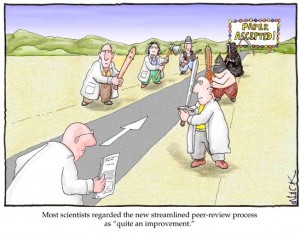 It may not be easy to keep your temper when responding to referees’ comments but you must make it seem like the easiest thing in the world. Whether the comments are on a grant application or a paper, you should compose your response with regard to the effect you want it to have on the reader. If you want your response to influence a grants committee to award your grant or a journal editor to publish your paper, anger is unlikely to help.
It may not be easy to keep your temper when responding to referees’ comments but you must make it seem like the easiest thing in the world. Whether the comments are on a grant application or a paper, you should compose your response with regard to the effect you want it to have on the reader. If you want your response to influence a grants committee to award your grant or a journal editor to publish your paper, anger is unlikely to help.
There are some differences between responding to grant-application referees and paper referees but most of the following recommendations apply to both.
Assume that the referee is trying to be helpful. You will do a better job if you can make the assumption of reasonableness. If you can convince yourself that the referees are doing their best to help you and their comments are genuinely trying to help you improve your research project or your paper, it will be easier to follow most of the recommendations below. It doesn’t matter if the assumption is wrong and the referees are actually trying to sink your grant or turn your paper into tedious gibberish. The important point is that you will do a better job of responding to them if you assume that they are trying to help.
Take responsibility for the reader’s failure to understand. Some writers take pride in the knowledge that very few people understand their work. I have seen responses from grant applicants that berated referees for their stupidity. That is a risky attitude to take in any type of writing and is almost certain to lead to the failure of a grant application.
Express gratitude for referees’ suggestions. Derrington’s first law of responding to referees states “The less you feel gratitude, the more fulsomely you should express it”. This is probably more important in the case of a paper than a grant application because in the case of a paper the referee will usually be consulted about whether your response is satisfactory whereas in the case of a grant application your response will be usually assessed by the grants committee. Of course it may help you to express gratitude if you can explain how the referees insightful suggestions have enabled you to transform the research project or paper.
Make it clear that the responding to the referees’ suggestions has enabled you to improve the research project (or paper). There are two reasons for this.
- First, you want to give the impression that the final version of your paper (or grant application) is much better than the version that the referee evaluated and deserves a higher score than the referees gave it.
- Second, you may want to distract the referee (or the grants committee) from the fact that you may not have made any changes at all. In this case, Derrington’s second law of responding to referees applies “The less you change, the more emphatically you state how much you have changed and how much this has transformed the paper.”
Derrington’s second law is more important for papers than for grants, because journal editors often regard referees’ recommendations as binding and authors often find them unacceptable. A grants’ committee is much more likely to recognise when a referee’s recommendation is ridiculous and accept a response that politely declines to implement it.
State clearly what you are responding to and how. This is particularly important when referees’ comments and suggestions are vague or ambiguous. It is often helpful to paraphrase the referees’ suggestions and to state what changes you have made in response to each one. This is a good way of dealing with the case when two or more referees suggest almost exactly the same thing. A list of your paraphrasings of the referees’ suggestions and a short statement about how you have responded to each one can make a very helpful executive summary that will reassure the reader that you have responded satisfactorily.
Some journals require you to do this but few funding agencies do. Even so, you should do it because it is likely to increase your chance of getting funded because it reassures the committee that you have responded satisfactorily to the referees’ criticisms.
Keep your overall response as short and simple as possible. This is more important with grant applications than with papers because the committee works under immense time pressure.
Know when to give up. If the referees’ reports on a grant are uniformly lukewarm it is unlikely to get funded whatever you say. Paradoxically, faint praise is more damning than strong condemnation because condemnation can give the impression that the referee is biased.
Of course, if you are overwhelmed by the desire to let the referees know how stupid their comments are, you probably won’t be able to follow any of the advice I have given so far. In that case I suggest that you wait until you can. Responding to referees is like inviting an elderly relative to dinner, better not to do it than to do it with bad grace.
